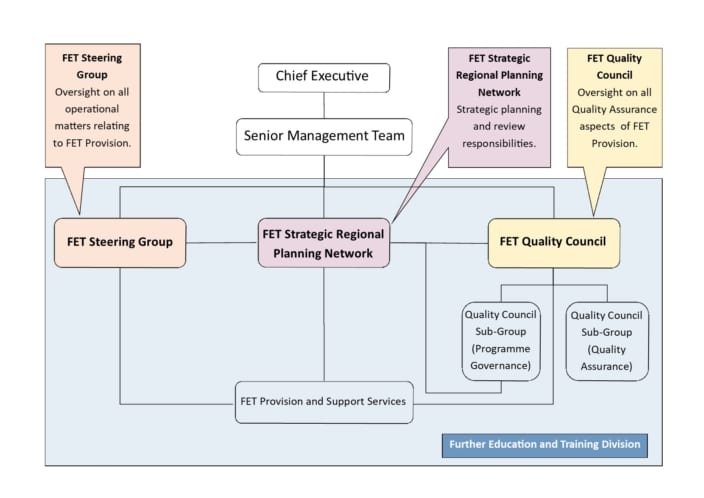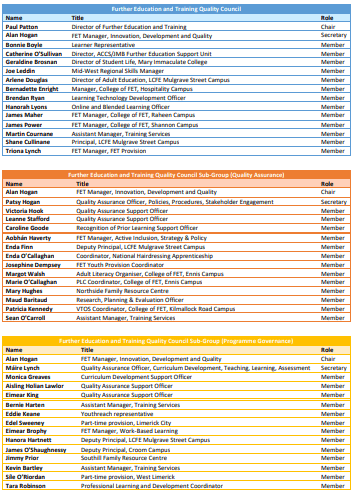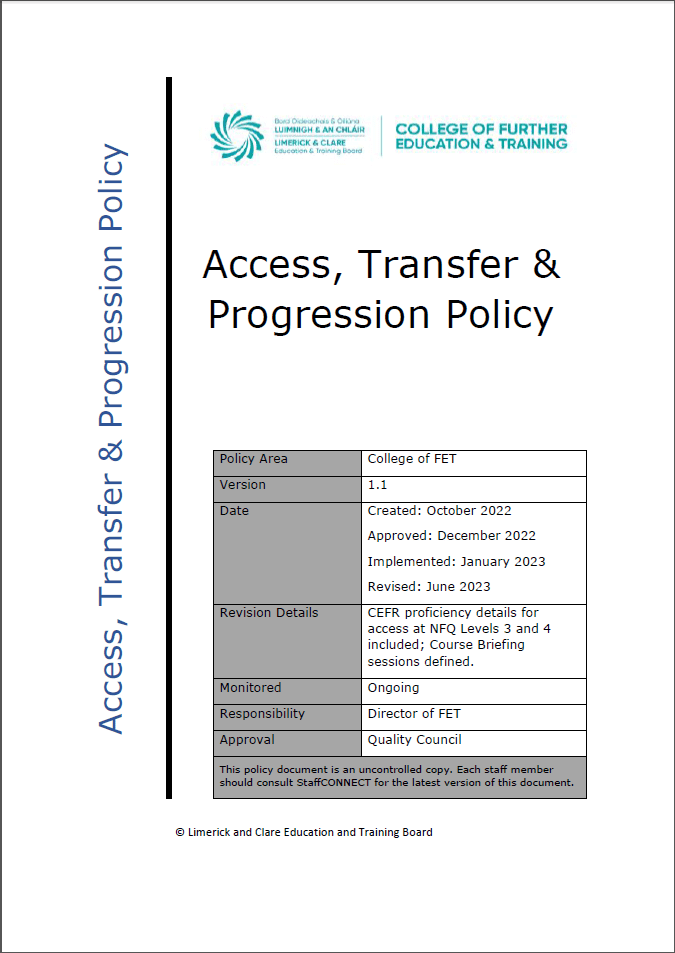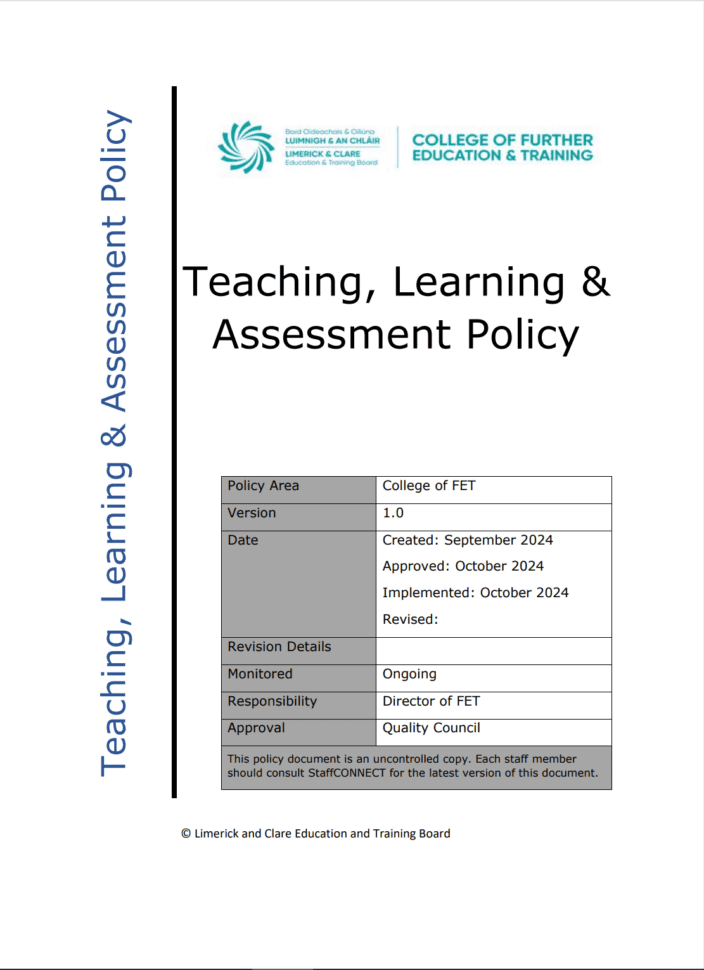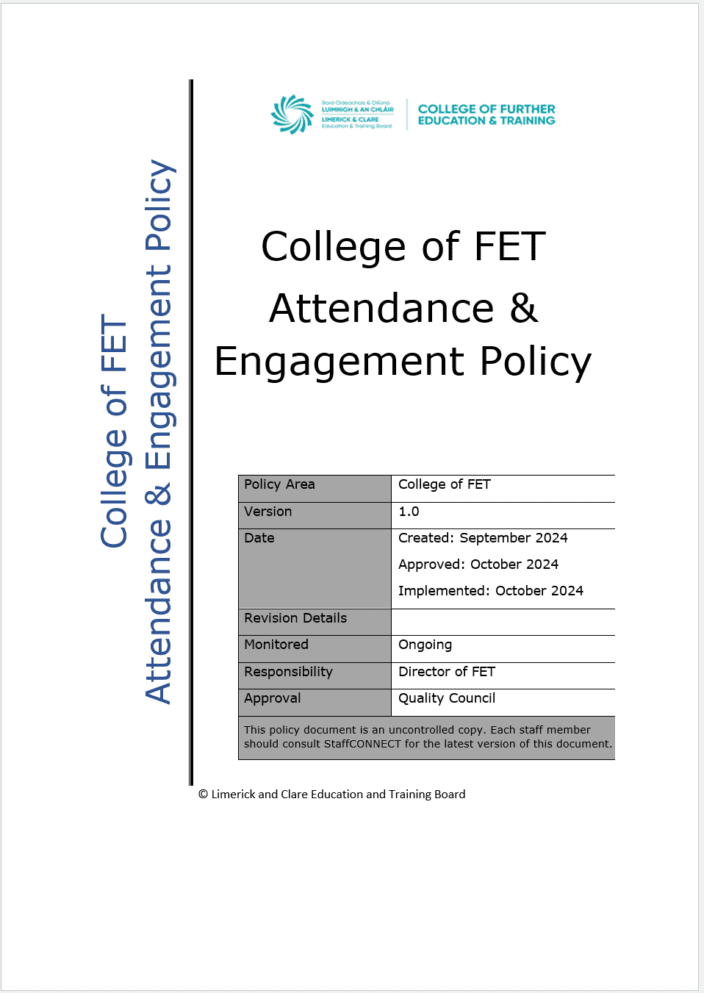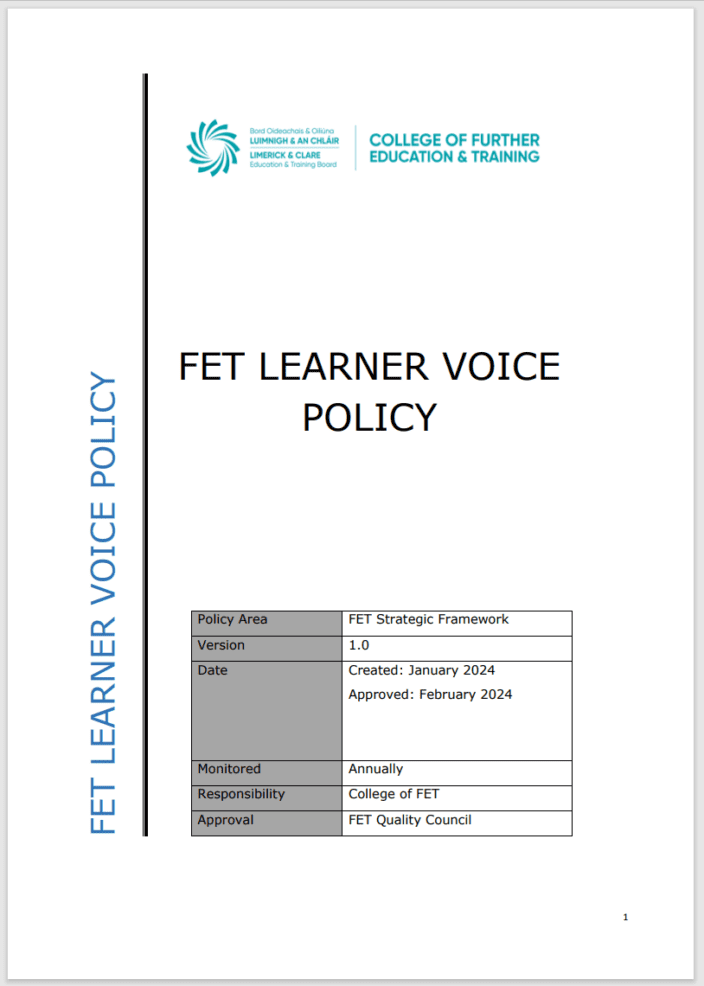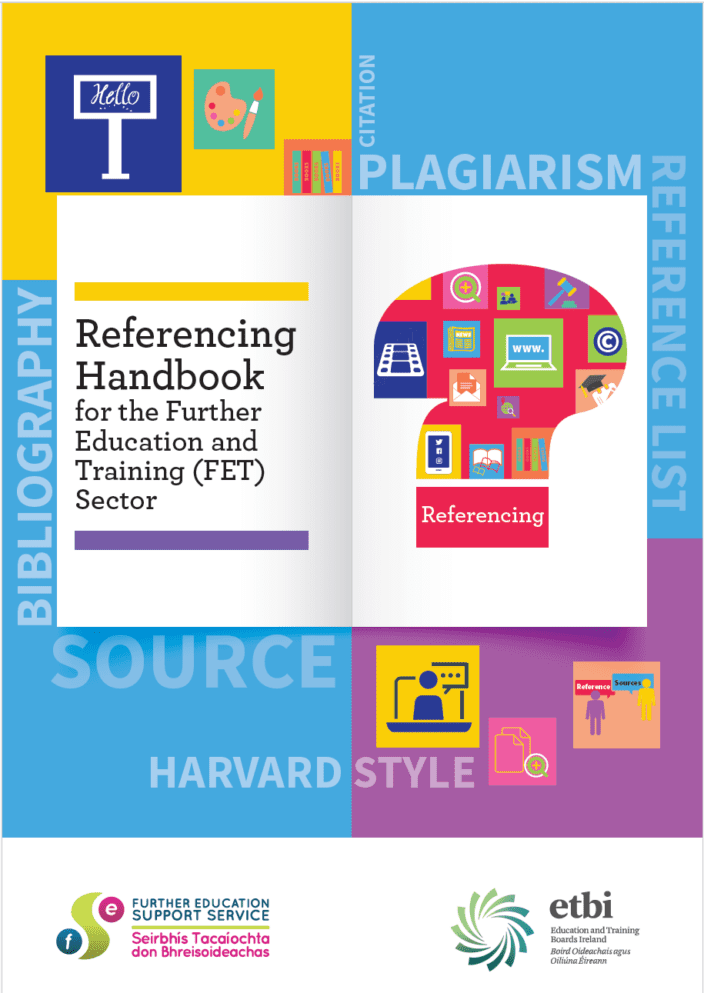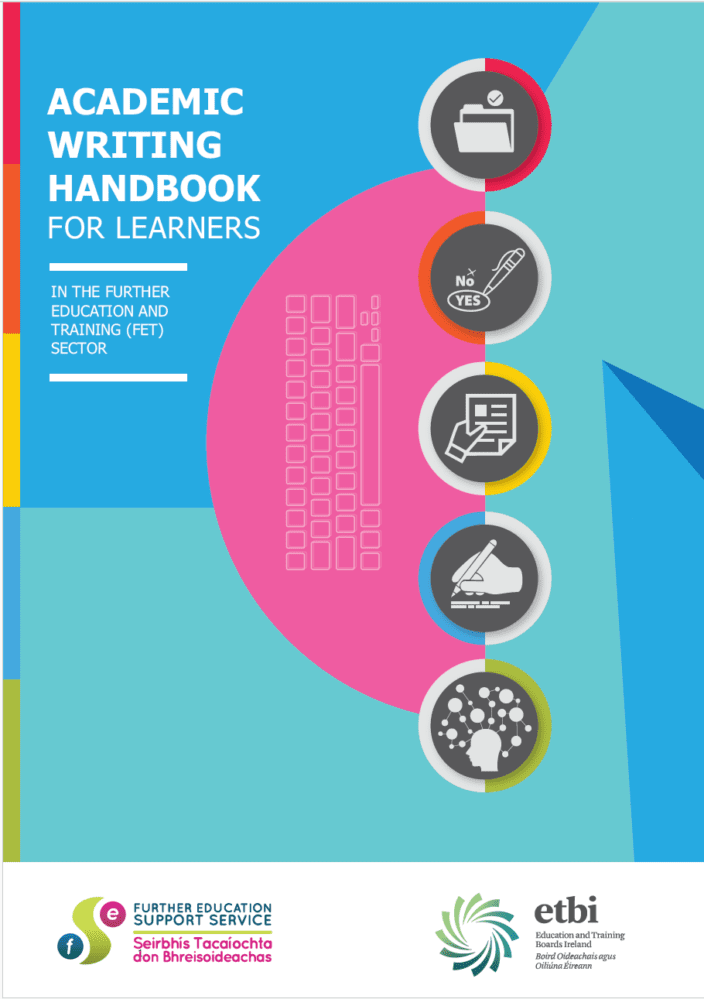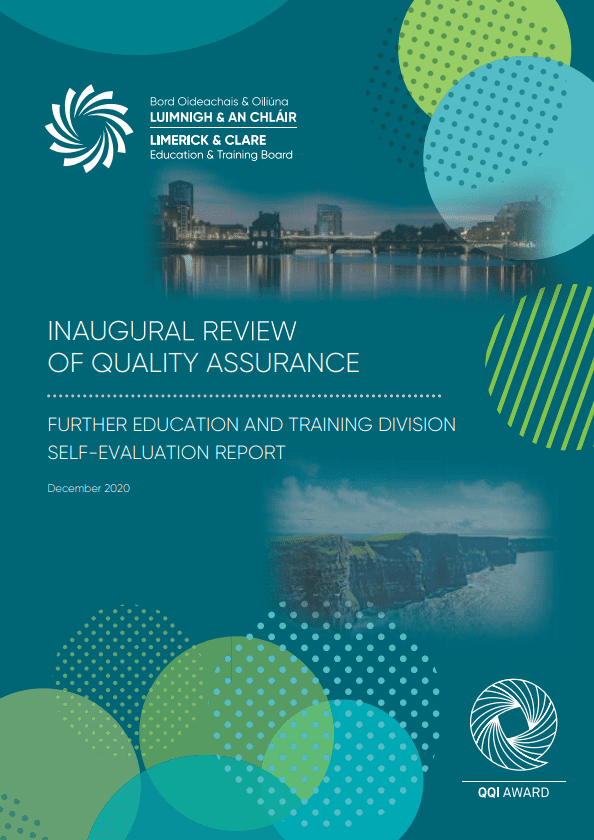Your learning matters. We’re committed to ensuring that every course you take is fair, consistent, and tailored to your success.
Below, you can explore how we maintain quality, how it affects your learning, and how you can help us improve.
What is Quality Assurance?
Quality Assurance is how we ensure your course is fair, well-organised, and meets national standards.
📋 Clear Courses – Programmes are structured and meet QQI standards
✅ Fair Assessment – Transparent processes, with support and appeals
💬 Learner Feedback Matters – You help shape what happens next
Quality Assurance is how we make sure your course is well-planned, fairly delivered, and meets national standards.
It’s about giving you a positive learning experience with clear goals, fair assessments, and opportunities for your voice to be heard.
Every course goes through a process called validation, which checks that it’s properly structured and meets the standards set by Quality and Qualifications Ireland (QQI).
Courses are reviewed regularly and updated based on feedback from learners, staff, employers, and others.
Assessments follow clear marking guidelines. You’ll always know what’s expected of you.
Your work is first assessed by the learning practitioner who delivers your course, and sometimes reviewed an external examiner.
This ensures results are fair and consistent, and makes sure that they are in line with national standards.
Yes – and we really value it.
You’ll be invited to complete feedback surveys during and after your course. Some campuses also have learner voice forums or learner reps who gather feedback and ideas.
Your views help us improve what we do.
We take learner feedback seriously.
Every year we produce a “You Said This, We Did This” summary showing what changes were made based on what learners told us.
This might include changes to timetables, extra supports, or better communication about assessments.
If you think your result is incorrect or unfair, you have the right to appeal.
There’s a clear, step-by-step process to request a recheck or review.
You can also make a complaint if something about your course or assessment didn’t go as it should. We’ll guide you through it.
All our policies are available in plain English and can be downloaded.
These include policies on assessment, learner supports, appeals, complaints, and feedback.
You don’t need to read them all – but they’re there if you want to understand your rights and how we work.
We support all staff in delivering inclusive, learner-centred, and high-quality education through clear policies, resources, and continuous improvement.
We provide:
-
Programme and module templates
-
Assessment and verification procedures
-
Professional development and QA updates
-
Guidance on feedback, appeals, and results approval
Staff play a key role in quality enhancement, and we welcome reflective practice, innovation, and learner feedback as part of that process.
We work closely with stakeholders to ensure our programmes are responsive, relevant, and impactful in the real world.
Through collaboration, we:
-
Co-develop programmes that meet workforce and community needs
-
Use employer and partner input to shape content and delivery
-
Share outcomes and improvements based on learner and sector feedback
Partners help us ensure that learning at College of FET leads to real skills, opportunities, and progression.
Our QA system aligns with QQI’s Core Statutory, Topic-Specific, and ETB Sectoral Guidelines to ensure accountability, transparency, and ongoing enhancement.
Our governance includes:
-
Programme validation and revalidation processes
-
Internal verification and external authentication
-
Results Approval Panels and follow-up actions
-
Learner voice, staff feedback, and performance indicators
We report annually to QQI, contributing to national quality goals and continuous sectoral improvement.
In this new Strategic Framework, we have identified key areas of consolidation, as well as areas of transformation, to ensure we can respond locally to demands for new skills and contribute to the advancement and implementation of the national FET priorities: Building Skills, Fostering Inclusion and Creating Pathways.
We are committed to contributing to these national priorities, and have adopted them as the pillars of our Framework. They form the core of our FET mission as the state education and training authority for the Limerick and Clare region.
We have also identified key enabling strategies, which give us a roadmap to deliver the results we want to achieve over the next 5 years:
- Learner-Centred Approach;
- Staffing and FET Capability;
- FET Curriculum;
- Infrastructure and Performance;
- Partnerships for Transitions.
Our main focus is to build on the excellence of FET, by integrating key foundational elements – such as technology, curriculum, quality assurance, and unique interventions – such as learner supports, inclusive designs and engagement strategies. Ultimately, we want to offer learners the best education and training opportunities so they can experience the transformative culture of lifelong learning and thrive in their lives, academic and career pursuits.
Quality Assurance in Limerick and Clare Education and Training Board Further Education and Training division is a multi-layered process, complying with the QQI Sector Specific Guidelines for the ETB Sector ‘Given the distributed, diverse and evolving nature of ETBs, it is important that a multi-layered system be in place so that quality and its assurance is monitored in a consistent and appropriate way within and across the various
Limerick and Clare ETB Governance Structure Chart
Further Education and Training Quality Council
Limerick and Clare Education and Training Board have formalised the establishment of the Further Education and Training Quality Assurance Governance structures, including the establishment of a Quality Council.
The role of the Quality Council is to “Oversee all Quality Assurance aspects related to the design, development, approval, implementation, monitoring and review of the Further Education and Training provision offered by Limerick and Clare Education and Training Board.
It protects, maintains and develops the standard of Education and Training programmes and related activities. In doing so, the Further Education and Training Quality Council is ensuring, as far as possible, that all learners receive an equivalent experience Quality Assurance Governance.
The Quality Council Sub-Group (Quality Assurance) has responsibility for the development, oversight, planning, co-ordination, and improvement of quality assurance policies, procedures and processes.
The Quality Council Sub-Group (Programme Governance) has responsibility for the oversight, planning, co-ordination, development and quality of all of the programmes of Limerick and Clare Education and Training Board.
Terms of Reference
Terms of Reference of Limerick and Clare ETB Quality Council
Terms of Reference of Limerick and Clare ETB Quality Council Sub-Group (Quality Assurance)
Terms of Reference of Limerick and Clare ETB Quality Council Sub-Group (Programme Governance)
Membership
Membership of Quality Council, Quality Council Sub-Group (Quality Assurance) and Quality Council Sub-Group (Programme Governance) are documented here
Quality Council Meeting Agendas and Minutes
| 2021 | 2022 | 2023 | 2024 |
|---|---|---|---|
| Feb 2021 Agenda | March 2022 Agenda | March 2023 Agenda | Feb 2024 Agenda |
| Feb 2021 Minutes | March 2022 Minutes | March 2023 Minutes | Feb 2024 Minutes |
| June 2021 Agenda | June 2022 Agenda | June 2023 Agenda | May 2024 Minutes |
| June 2021 Minutes | June 2022 Minutes | June 2023 Minutes | June 2024 Agenda |
| July 2021 Minutes | Sept 2022 Agenda | Nov 2023 Agenda | June 2024 Minutes |
| Sept 2021 Agenda | Sept 2022 Minutes | Nov 2023 Minutes | Oct 2024 Agenda |
| Sept 2021 Minutes | Dec 2022 Agenda | Dec 2024 Agenda | |
| Dec 2021 Agenda | Dec 2022 Minutes | Dec 2024 Minutes | |
| Jan 2022 Minutes |
Further Education and Training Strategic Regional Planning Network
FET Strategic Regional Planning Network provides a coherent regional-based approach to planning in consultation with all relevant stakeholders in order to identify needs, avoid duplication, enhance integration and ensure that strategic priorities and targets are addressed. This also supports the emergence of the development of curriculum specialisms.
The FET Strategic Regional Planning Network promotes a shared vision across the ETB’s FET Division and guides its FET Colleges and Centres in the development of integrated implementation plans for full-time and part-time FET Provision and Support Services.
Terms of Reference of Limerick and Clare ETB Strategic Regional Planning Network
- The Quality Assurance Support Service is part of the Innovation, Development and Quality (IDQ) Support Service of Limerick and Clare Education and Training Board’s College of FET (CFET), which drives the promotion of a positive quality culture. The IDQ supports the delivery of high-quality teaching and learning and a rich learning environment across the organisation, through coordinated, strategic, effective and integrated support services.
- The QASS plays a key role in supporting the attainment of the CFET quality strategic priorities. By promoting a consistent approach to quality across the CFET, maintaining quality standards, and fostering continuous improvement within FET campuses, the QASS enables the One Strategy, One Team, One College approach.
- Quality assurance is about managing risks that could affect the quality of teaching, learning and assessment in the CFET. The QASS supports the overall performance and reputation of the ETB by promoting a quality culture, while also ensuring compliance with statutory quality obligations set by accreditation bodies, and educational authorities.
- Ultimately, the QASS’ focus is on enhancing the learner experience at all delivery points, through promoting consistent quality standards, identifying areas for enhancement and addressing them effectively in collaboration with CFET Co-ordinators and practitioners.
Quality Assurance Support Service Action Plan 2024 – 2027
Limerick and Clare Education and Training Board is developing a single, integrated set of policies and procedures as informed by the requirements of the QQI core and sector-specific guidelines.
New policies that have been developed to date are detailed below.
Schedule for review of approved Polices and Procedures is detailed here.
Limerick and Clare Education and Training Board College of FET Policies
Assessment Procedures
All information relating to Quality Assurance is located in the Quality Assurance StaffCONNECT site here.
Content of the site includes:
- Quality Assurance Policies and Procedures
- Standardised Assessment Templates
- Programme and Module Descriptors for all validated and approved programmes
- Schedule and booking Quality Assurance Professional Development courses
- Quality Assurance news and updates
- Policy and process for programme management
- Certification management system
The authority’s Quality Assurance Support Service publishes a quarterly Quality Assurance Newsletter, distributed to all staff via email and the StaffCONNECT SharePoint site.
Staff Quality Assurance newsletters –
Annual College of FET Learner Survey
Limerick and Clare Education and Training Board College of Further Education and Training, in their 2022 Quality Assurance Inaugural Review Action Plan and subsequent QA Review follow up report, committed to carrying out an internal audit of Learner’s feedback mechanisms across FET campuses.
This priority action was agreed following the QQI 2021 review recommendation that ‘Limerick and Clare Education and Training Board establish clear mechanisms to capture learners’ feedback in a consistent manner’.
The roll out the College of FET Learner voice consultation process was carried out via an online survey during a “College of FET Learner Consultation Week” commencing on 17th April 2023.
Staff Recruitment
Limerick and Clare Education and Training Board has recruitment policies and procedures in place, managed by Human Resources Department in line with nationally agreed policies and procedures.
Professional Learning and Development
About the Professional Learning & Development (PL&D) Support Service
The PL&D Support Service collaborates with staff, coordinators, and other stakeholders to identify and arrange professional learning opportunities in several key areas. Our goal is to foster a culture of continuous learning throughout the organisation by providing a calendar of events, monthly updates, training needs analyses, and resources. We also offer funding, support for campus-specific initiatives, and manage Erasmus+ projects focused on staff mobility and professional development. For more about the team behind PL&D, click here.
What is PL&D?
Professional Learning and Development (PL&D) involves any activity that helps individuals enhance their skills, knowledge, expertise, and other competencies essential for their role.
What Does the Professional Learning and Development Support Service Do?
Guided by our 2019-2024 PL&D Action Plan, our service delivers a range of support initiatives, including:
- Event Coordination: Developing a calendar of events that enables FET staff to enhance their skills in teaching and learning.
- Monthly Updates: Sharing regular email updates featuring internal and external professional development opportunities.
- Needs Analysis: Conducting training needs analyses to inform the design and delivery of in-house training.
- Recognition: Awarding PL&D Digital Badges via Moodle for staff participation.
- Peer Collaboration: Supporting learning networks and communities of practice to encourage staff collaboration.
- Funding & Policy Development: Providing campus-specific funding and developing PL&D policies.
- International Projects: Overseeing Erasmus+ staff mobility projects and additional international initiatives within the College of FET.
What are the PL&D Priority Areas?
Our professional development initiatives are aligned with priority areas drawn from national policies, SOLAS and QQI frameworks, the College of FET Strategic Framework, and local needs. Key areas include:
- Vocational and Subject Matter Reskilling and Upskilling
- Active Inclusion
- Technology Enhanced Learning
- Corporate Compliance
- Teaching and Learning
- ICT and Digital Skill Development
- Mental Health and Wellbeing
- Quality Assurance
- Information, Recruitment, and Guidance
These focus areas reflect the latest developments in education and workforce needs, ensuring our professional learning aligns with both local and national objectives. Collaboration with Corporate Services, Support Services, and other departments ensures a cohesive, well-resourced approach to training.
We are committed to supporting staff in their professional journey and look forward to contributing to the organisation’s learning culture.
Limerick and Clare Education and Training Board Programme Delivery Request, Development & Validation Policy establishes the Terms of Reference for the Limerick and Clare Education and Training Board Programme Group. The policy has been devised to ensure that Limerick and Clare Education and Training Board has a robust governance process in place to deal with programme delivery, development and validation requests and to ensure that Limerick and Clare Education and Training Board complies with the requirements of the QQI Sector Specific Guidelines ‘An ETB is responsible for the design, development, approval, monitoring and review of all programmes, including programmes leading to QQI awards’.
An Limerick and Clare Education and Training Board centre must submit a ‘Programme Request Proposal Form’ for approval to the Limerick and Clare Education and Training Board Programme Group where it plans to:
- access and deliver existing validated programmes/modules/awards for the first time;
- access and deliver existing validated programmes/awards where that programme has not been delivered incentre for the past three years;
- develop new programmes/modules for validation with a view to their delivery;
- request to develop a shared programme;
- request to participate in the development of a joint programme/module.
The proposal must contain a ‘Needs Identification’ which outlines a rationale for the programme such as:
- how it might be meeting learner needs, national and/or local skills needs, an educational need in community etc.;
- evidence of how the programme fulfils national policy recommendations e.g. in terms of activation, active inclusion etc.;
- evidence of stakeholder engagement e.g. employer engagement in identifying local skills needs, engagement in programme development, review etc.;
- identification of the award that best meets the needs of the programme;
- staffing requirements;
- funding requirements;
- development requirements.
Meeting six times per year, the programme group is scheduled to provide timely decision making for centres, ensuring centres can respond effectively to labour market demands. Programme request approvals are closely linked to the functions of the QA Support Service, with associated centre visits, staff professional development, verification of specific validation requirements.
Limerick and Clare Education and Training Board Further Education and Training Division is an amalgamation of seven (7) former FETAC providers, consisting of 33 individual centres of Further Education and Training. All Limerick and Clare Education and Training Board Further Education and Training centres have agreed policies and procedures in relation to assessment of learners, these have all been adopted as Limerick and Clare Education and Training Board procedures as part of the regularisation agreement between QQI and Limerick and Clare Education and Training Board.
Limerick and Clare Education and Training Board’s FET Division works closely with the National QA Initiatives as established by ETBI and are working towards developing a common set of QA policies and procedures, with an aim to “Develop and Implement a structured Limerick and Clare Education and Training Board Further Education and Training QA policies has included such actions as:
- Co-ordinated approach to staff development between QA Support Service and FET Professional Development Officer, resulting in a comprehensive suite of staff professional development being offered;
- Introduction of Moodle and Digital Badges to distribute development courses and award staff for attendance at professional development events;
- Structured QA management and governance processes including publication of Terms of Reference for QA Implementation Group and QA Working Groups;
- Streamlining assessment processes by:
- Standardising assessment templates;
- Introducing single versions of module descriptors for all level 5 and 6 modules;
- Standardising External Authentication process and Results Approval Process;
- Managing a single learner appeals process;
- Developing communities of practice for developing exemplars of assessment;
- Inputting into ETBI Assessment procedures working group.
Limerick and Clare Education and Training Board are committed to developing a single set of QA policies for all Further Education and Training centres, incorporating all National and International Awarding Bodies. These sets of policies will be developed into context specific policies appropriate to the nature of provision, in line with the recommendation from the QQI Sector Specific Guidelines “While taking on board the individual context of each ETB, quality assurance procedures established will have regard to ETB sectoral policies and frameworks established by ETBI to ensure commonality and consistency of approach across the sector.”
Learner Admission
Management of learner admissions policies and procedures remain at centre level across Limerick and Clare Education and Training Board centres. Centres continue to operate previously approved procedures in relation to learner admissions, with local variances in approach to advertising, information, interview, pre-entry assessment, English language testing as appropriate. Best practice in the context of centre provision, appropriate to the literacy/technical/vocational/etc. needs of the target cohort. Development of LCETB policy is ongoing, complying with the requirements of the QQI Core Statutory QA guidelines Section 3.2, Learner admission, progression and recognition “Access policies, admission processes and criteria are established and implemented consistently and in a transparent manner and in accordance with national policies and procedures for Access, Transfer and Progression (ATP).”
It is expected that any learner seeking to access a particular course would have knowledge, skills and competencies at the level of the NFQ detailed in the programme descriptor for access on to that programme. Depending on the centre, it is the responsibility of the course coordinator or other identified staff member, to determine that the learner has the knowledge, skill and competence to successfully participate on the course. Typically, prospective learners would attend an interview to assess their suitability for the course for which they are applying. The admissions interview is conducted by the course coordinator or an experienced teacher on the course. The purpose of the interview is to assess whether the learner meets the entry criteria for the course where these exist, or to facilitate the learner to find the course most suitable for their needs. Further, course specific, information will be given to learners upon entry to the course.
Learner Supports
Learners are encouraged, upon application for admission, to disclose any special needs or disabilities they may have, in order that appropriate supports or reasonable accommodations may be put in place. Where such a disclosure is made, an appropriate staff member will meet the learner to discuss the nature of the supports that may be required. Depending on the nature of those supports, and the centre in which the course is being delivered, that staff member may be the centre manager/deputy centre manager, guidance counsellor, the FE/course coordinator, or the class tutor. The nature of the supports may involve application for a HEA grant in the context of an Further Education learner (e.g. for laptop, Lightscribe pen, sign language interpreter etc.) and other reasonable accommodations, such as extra time in an exam.
New guidelines around reasonable accommodations are being developed by the ETBI Assessment Procedures Working Group, and these will inform the development of the common Limerick and Clare Education and Training Board policy on reasonable accommodations.
Every reasonable effort is made to support learners with differences, either before admission or once they have started on the course. Such differences might include prior learning or experience, maturity, differing capabilities or other. In this case, the supports needed will be agreed in consultation with the learner, and could include one-to-one learning supports around additional literacy or maths needs, or other additional tutoring where this may be required. However, it is acknowledged that not all support needs may be able to be met within the physical, financial and staffing restrictions within which the centre and Limerick and Clare Education and Training Board must operate.
Development of Limerick and Clare Education and Training Board’s ‘Framework for the Integration of Language, Literacy and Numeracy (ILLN)’18 is core to the vision and core purpose of the Limerick and Clare Education and Training Board FET Division, with the aim of the framework defined as “The Limerick and Clare Education and Training Board FET Division provides a diverse range of education and training options, our learners are young people and adults of all ages, full-time and part-time, based in classrooms, the community, workplaces or at home. The Limerick and Clare Education and Training Board FET Framework for the Integration of Language, Literacy and Numeracy (LLN) is part of a wider strategy to ‘increase levels of active inclusion through the provision of high-quality, more accessible and flexible education, training and development interventions and supports to suit the individual’ (SOLAS, p.91).
‘Active inclusion means enabling every citizen, notably the most disadvantaged, to fully participate in society, including having a job.’ (SOLAS, p. 91) In a further education context, ‘active inclusion’ means enabling every learner to fully participate in the educational opportunities available to them. Since language, literacy and numeracy skills are essential to all areas of learning, it is necessary to ensure that literacy and numeracy interventions and supports are available to all learners.
The Limerick and Clare Education and Training Board Framework for the Integration of Language, Literacy and Numeracy (LLN) outlines our approach to providing language, literacy and numeracy interventions and supports to meet the needs of all learners who participate in the programme strands that comprise the LCETB FET sector education and training opportunities. These interventions and supports aim to:
- Increase access to education, training and skill development opportunities by introducing language, literacy and numeracy supports across all programmes;
- Increase levels of active inclusion by improving learner engagement, participation and achievement;
- Strengthen learner resilience by better preparing learners for further education, employment and career mobility.”
Limerick and Clare Education and Training Board (LCETB), Further Education & Training Framework for the Integration of Language, Literacy and Numeracy (ILLN) – December 2016
Learner Feedback
Learner feedback is an essential element to the life cycle of a course within Limerick and Clare Education and Training Board. Feedback is sought for the significant majority courses through mid-term and end-of-term evaluations, and the information gathered can be used to address issues arising throughout the course, and informs future iterations of the course, e.g. with respect to module choice etc., as well as new course development. In addition, learners can raise any concerns or feedback they may have with either the course tutor or course coordinator at any time between the formal feedback opportunities.
Learner Admission Management of learner admissions policies and procedures remain at centre level across Limerick and Clare Education and Training Board centres. Centres continue to operate previously approved procedures in relation to learner admissions, with local variances in approach to advertising, information, interview, pre-entry assessment, English language testing as appropriate. Best practice in the context of centre provision, appropriate to the literacy/technical/vocational/etc. needs of the target cohort.
It is expected that any learner seeking to access a particular course would have knowledge, skills and competencies at the level of the NFQ detailed in the programme descriptor for access on to that programme. Depending on the centre, it is the responsibility of the course coordinator or other identified staff member, to determine that the learner has the knowledge, skill and competence to successfully participate on the course. Typically, prospective learners would attend an interview to assess their suitability for the course for which they are applying. The admissions interview is conducted by the course coordinator or an experienced teacher on the course. The purpose of the interview is to assess whether the learner meets the entry criteria for the course where these exist, or to facilitate the learner to find the course most suitable for their needs. Further, course specific, information will be given to learners upon entry to the course.
Learner Information and Guidance
All Limerick and Clare Education and Training Board learners will receive an induction session/s in which they receive general information about the centre, as well as course-specific information such as modules to be covered, the course calendar and timetable, assessments and assessment deadlines, centre attendance policies and procedures, assessment policies and procedures, supports available to learners, SUSI grants, code of conduct, complaints procedure and other relevant information. These inductions session will be facilitated and managed by the local centre.
Throughout the course, learners are kept informed of activities and assessment requirements through briefs distributed in class, course notice boards, and where available, through a VLE. Upon receiving notification of final results, learners are informed of their right to appeal their grade in accordance with the Limerick and Clare Education and Training Board Appeals Policy.
Recognition of Prior Learning (RPL) in Limerick and Clare Education and Training Board involves awarding the RPL applicant recognition in the form of access or advanced entry to a programme, credits within a programme, exemption(s) from element(s) of a programme, or a full award. RPL can be subdivided into Recognition of Prior Certified Learning (RPCL) and Recognition of Prior Experiential Learning (RPEL) and an application for RPL can be RPCL, RPEL or a combination of both.
Prior certified learning may entitle the applicant to access to a programme or exemptions from part of a programme (but not credits). As this certified learning has already been awarded credit, the applicant does not receive credits for it again, but recognition in the form of exemptions.
Prior experiential learning may entitle the applicant to access to a programme (non-standard entry, such as not having a Leaving Cert if this is a requirement), advanced entry (which is essentially an exemption from part of a programme, e.g., apprenticeship model) or certification (where RPEL is used to fully certify an applicant for a module(s) or a Major Award).
Limerick and Clare Education and Training Board is responsible for having a consistent approach to RPL and implementation must be in accordance with Limerick and Clare Education and Training Board’s College of FET Access, Transfer & Progression Policy.
More information on Recognition of Prior Learning can be viewed on this dedicated CollegeofFET.ie website – Recognition of Prior Learning (RPL) | College of FET

For more detail, the linked document College of FET Guidance of Artificial Intelligence (AI) use has been developed to support learners.
Limerick and Clare Education and Training Board has data protection policies in place to comply with legislation. Access to databases is by named and authorised personnel only for the purposes of entering data in local centres and for reporting as appropriate at local centres or centrally within Limerick and Clare Education and Training Board.
For a full list of Limerick and Clare Education and Training Board policies, please click here.
Programme and Learner Support System (PLSS)
PLSS is a national SOLAS/ETBI initiative and data is hosted by SOLAS. The system incorporates the National Programme Database, the National Course Calendar, National Learner Database, and Funding Allocation Requests and Reporting (FARR) system. It is in the third year of its rollout, with a focus on on-going collaborative development and improvements nationally. Limerick and Clare Education and Training Board’s rollout of PLSS means that centres plan courses annually on FARR; they schedule courses on the National Course Calendar; they manage applicant referrals and direct applications to their courses, and they record retention, completion, accreditation, and progression rates on those courses. As the Learner Database is rolled out, and learner records are entered, these will remain available for historical purposes. Older records will remain available through legacy databases such as Salespulse for VEC provision, and DCS for self-financing hobby and leisure courses.
Other Data Management and Information Storage Systems
Limerick and Clare Education and Training Board uses a range of other data management systems in addition to the ones mentioned above, such as the QBS (QQI Business Systems) used by former VEC centres to enter learners for certification, and the RCCRS (Results Capture and Certification Request System), which used in training centres to upload results on to QBS, and still being done through SOLAS. The training centres also use AppClient Management System for apprenticeship programmes and SAP for administration and reporting purposes.
The StaffConnect SharePoint site is available to all staff in Limerick and Clare Education and Training Board, and host the latest versions of programme and module descriptors, assessment resources, coordinators resources, and all templates and policies that have been revised since amalgamation, and are common across Limerick and Clare Education and Training Board.
The CAMS (Centralised Assessment Management System) used by the training centres, for storage of and access to assessment instruments. A decision with respect to the future of AISs and the CAMS will be made at ETBI level.
Moodle is available to all Limerick and Clare Education and Training Board centres through SOLAS, and is currently in use in many centres, particularly those in further education, as well as for the apprenticeship programmes in the training centres.
Limerick and Clare Education and Training Board is involved in a number of collaborative projects throughout Limerick and Clare.
Limerick and Clare Education and Training Board works collaboratively with Employers, Community/Voluntary Groups, Contracted Training, Other Providers, Department of Employment Affairs and Social Protection (DEASP), European FET projects etc. Clare Local Development Company, Paul Partnership in Limerick City, Limerick Community Education Network, West Limerick Resources Ltd., Ballyhoura Development are some of the community partnerships that have been developed.
The Learning Limerick collaboration culminated in Limerick receiving a UNESCO Learning City award (2017) in recognition of its partnership approach to building an inclusive lifelong learning framework in the City incorporating . communities, further education and training and higher education.
Limerick and Clare Education and Training Board was recognised for promoting inclusive learning from core skills to higher education; revitalizing learning in communities and families and providing effective learning for and in the workplace: Limerick and Clare Education and Training Board is a partner with Limerick and Clare County Councils in the delivery of the Age Friendly Strategies and Local Economic and Community Plans (LECP). The age friendly strategies promotes provision of lifelong learning opportunities for adults contributing to the decline of rural isolation and an increase in positive active age projects with libraries, sports partnerships etc.
SOLAS
SOLAS is responsible for the funding of a wide range of FET programmes within the 16 ETBs; as such, it is one of Limerick and Clare Education and Training Board’s key stakeholders. Limerick and Clare Education and Training Board submits an annual service plan to SOLAS, which includes performance targets, such as inputs, outputs, certification etc., and reports on these targets to SOLAS three times a year. In addition, Limerick and Clare Education and Training Board submits financial reports to SOLAS.
SOLAS has statutory responsibility for craft apprenticeships (as coordinating provider), of which Limerick and Clare Education and Training Board delivers a number in Phase 2. A Memorandum of Understanding between Limerick and Clare Education and Training Board and SOLAS is in place with respect to the Craft Apprenticeships, in addition to a range of systems and procedures to ensure the successful delivery of these programmes.
QQI
Limerick and Clare Education and Training Board is a legacy provider for QQI, currently operating under seven QA agreements, and working towards re-engagement with QQI. In addition to delivering QQI certification across 33 centres, in which learners achieved over 14,000 awards in 2016, Limerick and Clare Education and Training Board engages closely with QQI in a number of projects and engages in a range of sectoral consultation processes.
Department of Social Protection
The DSP works closely at a local level with Limerick and Clare Education and Training Board centres and colleges and is the primary referral agency for courses run in the training centres. An interagency agreement between Limerick and Clare Education and Training Board, Limerick and Clare Education and Training Board and the DSP is in place to manage this relationship.
Contracted Training
Contracted training is a procured service to deliver training on behalf of the ETB training centres. Successful contractors who win a tender may work with Limerick and Clare Education and Training Board training centres for up to four years. When delivering training on behalf of a training centre, they do so under the training centre’s QA agreement.
Community Training Providers
Community Training provides training within the community for people who are economically or educationally disadvantaged. This is a granted service for programmes delivered on behalf of training centres; internal verification is undertaken by the provider, all results are reviewed by the training centre RAP, and all certificates are ordered through the centre.
Other Awarding Bodies
Limerick and Clare Education and Training Board has quality assurance arrangements and agreements in place with a number of other awarding bodies, including City and Guilds.
Based on the new QQI Quality Assurance guidelines, Limerick and Clare Education and Training Board will incorporate these arrangements, as well as unaccredited provision, in the development of new quality assurance policies and procedures.
ETBI
Education and Training Boards Ireland (ETBI), is the national representative association for Ireland’s sixteen Education and Training Boards. ETBI provides a broad range of coordination and professional supports to ETBs, including facilitating collaboration between ETBs, staff development and the coordination of policy development.
ETBI supports and coordinates a number of working groups and forums to assist ETBs in the development of policy and practice to enhance and improve activity and delivery within the sector. These groups include, among others:
- Chief Executives forum
- Directors (FET, OSD, Schools)
- FET Steering Group
- Quality Assurance Forum
- New apprenticeship development group
Limerick and Clare Education and Training Board policies, including Access Request Policy and Data Protection policy are available on the Limerick and Clare Education Training Board Corporate website via this link.
In 2017, Limerick and Clare Education and Training Board’s Further Education and Training Division conducted an Executive Self-Evaluation to evaluate the effectiveness of legacy Quality Assurance in the context of the requirements of QQI Core and Sector Specific QA Guidelines.
The Executive Self-Evaluation process evaluated the governance and management of quality assurance and the effectiveness of quality assurance procedures and contributed to the development of an improvement plan which will support the ETB in meeting its statutory requirements for the establishment and operation of internal quality assurance procedures, recognising the developmental and transitional contexts.
As defined by the terms of reference, the objectives of the ETB Executive Self-Evaluation are:
- To contribute to and support the ETB quality improvement planning and ETB ownership and governance of quality and quality enhancement.
- To promote the improvement of quality assurance and further embedding of a quality culture in the ETB.
- To support sectoral level improvement by ensuring there is a consistency in the approach to the executive self-evaluation process, thematic focus and criteria applied self-evaluation report format and improvement plan.
- To identify current gaps and priorities for improvement in the context of QQI statutory QA guidelines.
Limerick and Clare Education and Training Board’s Further Education and Training Division submitted the completed Executive Self Evaluation Report and Quality Improvement Plan to QQI on the 9th October 2017. Click on the title below to view either document.
The Limerick and Clare Education and Training Board Further Education and Training Quality Improvement Plan details 18 discrete quality improvement actions for 2018, in areas of Governance, Documentation, Programmes, Professional Development and Consistency of Assessment.
An Initial Quality Dialogue Meeting took place between the authority and QQI on 15th November 2017. An excerpt from the resultant note of the meeting states: “Following discussion, it was acknowledged that Limerick and Clare Education and Training Board is actively having regard to relevant quality assurance guidelines published by QQI.” The QQI Executive confirmed a consensus to recommend approval of Limerick and Clare Education and Training Board’s quality assurance procedures.
2018 Quality Improvement Planning Process
2018 QIP Progress Reporting and Planning Part 1 Overview of 2018
2018 QIP Progress Reporting and Planning Part 2 Detailed Update
2019 Quality improvement Planning Process
2019 QIP Progress Reporting and Planning Part 1 Overview
2019 QIP Progress Reporting and Planning Part 2 Detailed Update
Inaugural Review of Quality Assurance in Education and Training Boards
The Quality Assurance Inaugural Review by QQI aims to encourage a quality culture and enhancement of Teaching and Learning experience in ETBs; provide feedback to ETBs about organisation-wide quality and the impact of mission, strategy, governance and management on quality and the overall effectiveness of their quality assurance. It also aims to offer assurance to learners and the public that the learning experience is being monitored for good practice, and effective arrangements are in place for the quality assurance of its services. Overall its goal is to support system level improvement of the quality of Further Education and Training in ETBs. A key intended outcome of the reviews is the stimulation of an intra-organisational discourse on quality within each ETB through critical analysis and meaningful discussion.
Over the past few months, an internal self-evaluation process has taken place. Thank you to all FET staff and learners who took part in consultations to feed back on the effectiveness of our QA processes. The feedback was central to our self-evaluation process, and has been used as evidence to make recommendations for improvement.
Inaugural Review of Quality Assurance – Follow-Up Report
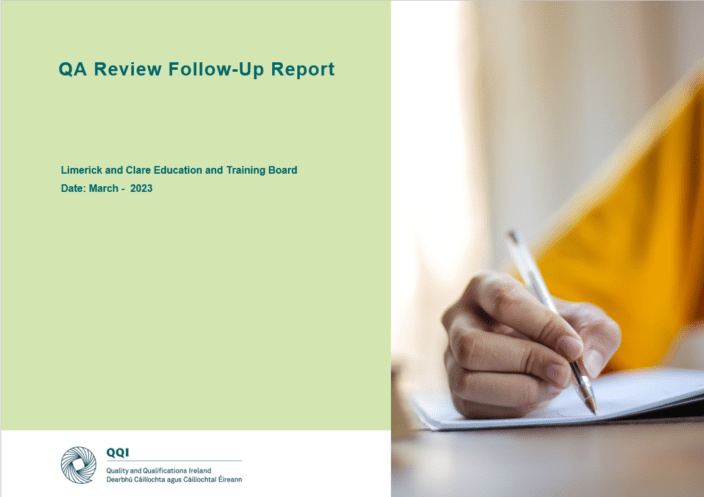 Following publication of the review report of the Inaugural Review of Quality Assurance, and one year after submission of its QA review action plan, Limerick and Clare ETB have submitted a follow-up report to QQI on progress against the plan, and how it is addressing the outcomes of the review. The report identifies the range of strategic and logistical developments and decisions that have occurred within the ETB since the publication of the review report and addresses each of the key findings and recommendations that the reviewers presented. Significant milestones are also be included, as well as reflections and learnings from the inaugural review process.
Following publication of the review report of the Inaugural Review of Quality Assurance, and one year after submission of its QA review action plan, Limerick and Clare ETB have submitted a follow-up report to QQI on progress against the plan, and how it is addressing the outcomes of the review. The report identifies the range of strategic and logistical developments and decisions that have occurred within the ETB since the publication of the review report and addresses each of the key findings and recommendations that the reviewers presented. Significant milestones are also be included, as well as reflections and learnings from the inaugural review process.
Interim Quality Report 2025
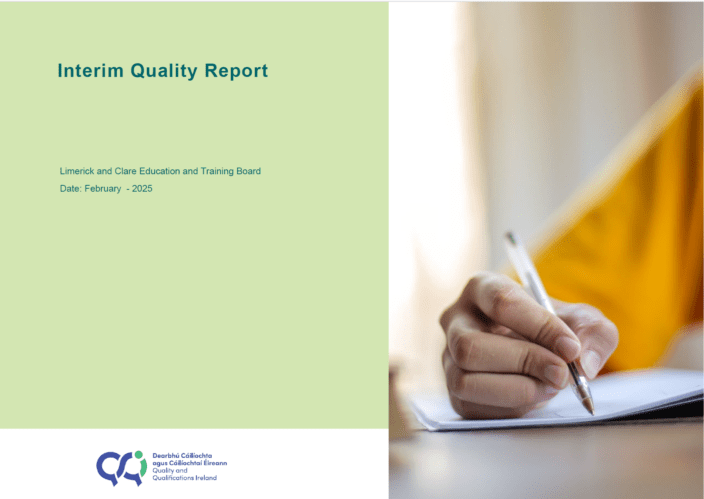 Case Study 1 – QA Client App – Integration of Certification process, planning & recording
Case Study 1 – QA Client App – Integration of Certification process, planning & recording
Case Study 2 – Raising Public Awareness of Recognition of Prior Learning (RPL)
Case Study 3 – TEL And QA Support Services Collaborative Response To An Evolving Digital Assessment Landscape.
Contact Information
Quality Assurance Support Service
College of Further Education and Training, Ennis Campus
Clonroad Business Park
Ennis
County Clare
V95 KT95
T: 065 671 6342
E: qa@lcetb.ie
QA Support Service Team
- Quality Assurance Officers
- Máire Lynch, Curriculum Development, Teaching, Learning and Assessment, maire.lynch@lcetb.ie
- Patsy Hogan, Policies, Procedures, Supports and Stakeholder Engagement, patsy.hogan@lcetb.ie
- Josephine Dempsey, Monitoring and Evaluation, josephine.dempsey@lcetb.ie
- Quality Assurance Support Officers
- Victoria Hook, victoria.hook@lcetb.ie
- Eimear King, eimear.king@lcetb.ie
- Aisling Holian Lawlor, aisling.holianlawlor@lcetb.ie
- Caroline Goode, Recognition of Prior Learning, caroline.goode@lcetb.ie
- Monica Greaves, Curriculum Development, monica.greaves@lcetb.ie
- Administration
- Bernie Kelleher, bernie.kelleher@lcetb.ie


